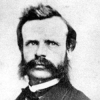John Wesley Powell

John Wesley Powell
John Wesley "Wes" Powellwas a U.S. soldier, geologist, explorer of the American West, professor at Illinois Wesleyan University, and director of major scientific and cultural institutions. He is famous for the 1869 Powell Geographic Expedition, a three-month river trip down the Green and Colorado rivers, including the first known passage by Europeans through the Grand Canyon...
NationalityAmerican
ProfessionExplorer
Date of Birth24 March 1834
CountryUnited States of America
belongs extremely nouns simply
Indian nouns are extremely connotive; that is, the name does more than simply denote the thing to which it belongs - in denoting the object, it also assigns to it some quality or characteristic.
consists linguistic parts
The integers of language are sentences, and their organs are the parts of speech. Linguistic organization, then, consists in the differentiation of the parts of speech and the integration of the sentence.
distinct express few ideas possible problem require vast
Possible ideas and thoughts are vast in number. A distinct word for every distinct idea and thought would require a vast vocabulary. The problem in language is to express many ideas and thoughts with comparatively few words.
civilized greater importance relatively verb
The verb is relatively of much greater importance in an Indian tongue than in a civilized language.
changed climate famine flood
Years of drought and famine come and years of flood and famine come, and the climate is not changed with dance, libation or prayer.
sublime elements canyons
The elements that unite to make the Grand Canyon the most sublime spectacle in nature are multifarious and exceedingly diverse.
rivers rocks landscape
The landscape everywhere, away from the river, is of rock - cliffs of rock; plateaus of rock; terraces of rock; crags of rock - ten thousand strangely carved forms.
running distance rivers
We have an unknown distance yet to run, an unknown river to explore.
running wall distance
We have an unknown distance yet to run, an unknown river to explore. What falls there are, we know not; what rocks beset the channel, we know not; what walls ride over the river, we know not. Ah, well! we may conjecture many things.
views labyrinth might
You cannot see the Grand Canyon in one view, as if it were a changeless spectacle from which a curtain might be lifted, but to see it you have to toil from month to month through its labyrinths.
art illustration speech
The wonders of the Grand Canyon cannot be adequately represented in symbols of speech, nor by speech itself. The resources of the graphic art are taxed beyond their powers in attempting to portray its features. Language and illustration combined must fail.